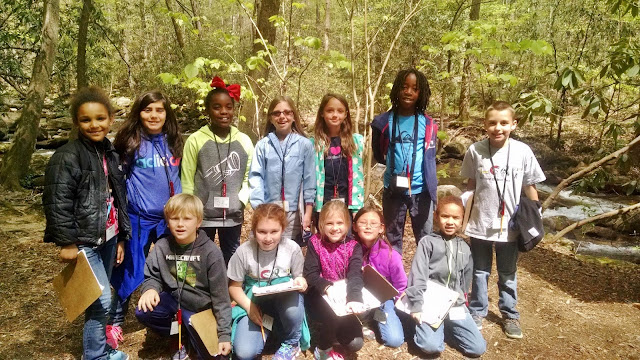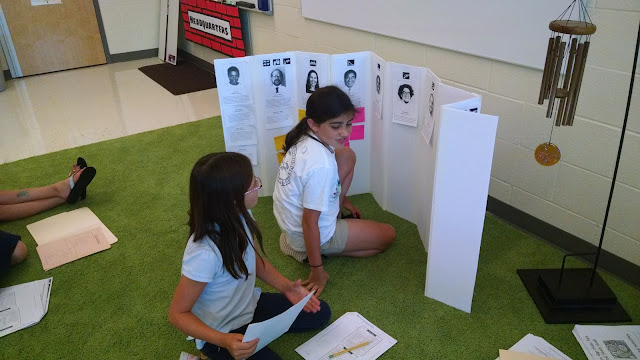We finished by creating an ALERT Top 5 and using it to prepare for our year-in-review game. Students answered systems questions using Kahoot and their responses earned them positive or not-so-positive inputs to their forest and pond snack ecosystems. A little acid rain with that dirt dessert?!? :) What a wonderful year and what a wonderful group!
Wednesday, May 25, 2016
The Finale!
Today students brainstormed solutions to the various problems they discovered in Gray Area. We played the role of city council members as students weighed the pros and cons of each proposal and voted into policy some of the best ideas. We also discussed the summer project opportunities, wrapped up our Rachel Carson study, and enjoyed some quality time together engaging in our most popular brain games from the year.
We finished by creating an ALERT Top 5 and using it to prepare for our year-in-review game. Students answered systems questions using Kahoot and their responses earned them positive or not-so-positive inputs to their forest and pond snack ecosystems. A little acid rain with that dirt dessert?!? :) What a wonderful year and what a wonderful group!
We finished by creating an ALERT Top 5 and using it to prepare for our year-in-review game. Students answered systems questions using Kahoot and their responses earned them positive or not-so-positive inputs to their forest and pond snack ecosystems. A little acid rain with that dirt dessert?!? :) What a wonderful year and what a wonderful group!
Wednesday, May 18, 2016
Gray Area Conclusion
We've made it to the end of our Gray Area investigations. Students have looked at acid rain, chlorine, sediments, phosphates, and oil as possible culprits in our mystery. Today we had an emergency board meeting to go over all the evidence and draw conclusions about the most likely reasons for the dying fish. Students justified their votes with evidence and found that the answer wasn't as cut and dry as they may have thought. As in real life, with so many elements at play, there is often a lot of "gray area" when it comes to making the best choices for ourselves and our environment. Next week we will look at possible solutions to the problems we've discovered and pros and cons of those as well. I was proud of all of the students' work, ideas, ability to think through different layers of the issues, and connections they made to our overarching systems theme.
Wednesday, May 11, 2016
Phosphates and Algal Blooms
Our Gray Area investigators were hot on a new trail today as they conducted various tests to determine if phosphate from fertilizer or manure might be causing an algal bloom in James Pond. With their eyes on the cattle ranch, small town, and golf course, they discovered algal blooms result from excessive algae growth. As the overabundant algae rots away, it causes bacteria to use up all the oxygen in the water, negatively effecting the fish population. Ask your student who we discovered our new leading suspect to be!
We also put on our poet hats and read Dogku to learn about the art of picking the perfect words to expressed our Jones Gap experience through Haiku.
Freezing cold water
Amazing creatures around
A beautiful day!
- Kailen
Bugs in the forest
They were having a meeting
On a big, fat, log.
- Kamryn
Cool, cold, wet, awesome
river. Splash! Freezing cold..whoa...
I don't want to ...SPLASH!
-Sydney
Going on a hike
Coming back to get in the
water. Find dead trees.
-Sean
It was like a dream
Amazing creatures passing by
Best experience
-Shaina
Wind blowing in my face
Fresh scent of blooming flowers
noisy birds tweeting.
-Gabby
Ran, tripped, was great!
Amazing animals, cool
freezing cold water.
-Kayden
I see nature here.
At Jones Gap State Park today
Nature everywhere.
-Mary Ann
Water sparkling
Moving body of water
The water is cold.
-Hailey
We also put on our poet hats and read Dogku to learn about the art of picking the perfect words to expressed our Jones Gap experience through Haiku.
Freezing cold water
Amazing creatures around
A beautiful day!
- Kailen
Bugs in the forest
They were having a meeting
On a big, fat, log.
- Kamryn
Cool, cold, wet, awesome
river. Splash! Freezing cold..whoa...
I don't want to ...SPLASH!
-Sydney
Going on a hike
Coming back to get in the
water. Find dead trees.
-Sean
It was like a dream
Amazing creatures passing by
Best experience
-Shaina
Wind blowing in my face
Fresh scent of blooming flowers
noisy birds tweeting.
-Gabby
Ran, tripped, was great!
Amazing animals, cool
freezing cold water.
-Kayden
I see nature here.
At Jones Gap State Park today
Nature everywhere.
-Mary Ann
Water sparkling
Moving body of water
The water is cold.
-Hailey
Wednesday, May 4, 2016
Population Boom
Today we investigated an interesting connection between the sediment problem from last week and the mountain lion hunting occurring in the area. Students played a game to simulate the fluctuation in the deer population with and without predators in the area. They found that mountain lion hunting reduces predators for deer and their population is able to experience booms and crashes. On these booms, deer overgraze and reduce ground cover, resulting in more erosion than usual.
We also did a creative activity where students were challenged to use design thinking and originality to create special hats for our friends the ats who are plagued by wild, pesky gnats. Here are some of their clever designs.
Several of the students were able to wrap up our Listening to Crickets novel study and enjoy a bit of the beautiful day.
Wednesday, April 27, 2016
Turbidity
Today students considered another factor that may be causing problems for fish in Gray Area. With logging an active business, some of the rivers were looking a little dirty. Students used secchi disks to determine the clarity, or turbidity, of the water in the various lakes and rivers in the area. They then examined the sediment files to understand the effects of erosion and high levels of sediments on the organisms living there.
 |
| Bare earth, verses plant material erosion demonstration. |
Thursday, April 14, 2016
Jones Gap Field Study
We had a wonderful learning experience at Jones Gap! Students explored the river and forest systems of the park. They were able to use field guides for plant and animal identification, conduct several water quality tests, and understand the important interactions between the two habitats. Thanks to all our wonderfully behaved students and fantastic chaperons!
 |
| Loaded up! |
 |
| Introduction bu Ranger Tim |
 |
| Creating our own adaptation for better hearing. |
 |
| Millipede paparazzi. |
 |
| Checking the pH of the Middle Saluda River. |
 |
| Checking the temperature of the river. |
 |
| Checking the turbidity of the water. |
 |
| Donning boots! |
 |
| Searching for macro-invertebrates. |
 |
| In the lab. Waterpenny. |
 |
| In the lab. Stonefly Nymph. |
 |
| The whole troop! |
Wednesday, April 6, 2016
Jones Gap Preparation
We spent today preparing by doing some review and covering expectations. Students can continue to practice the must-know terms at this link. We also looked at water quality test we will conduct at the park, layers of the forest, and life cycles of some of the macro-invertebrates we hope to find. Students did a great job researching and composing their expert cards highlighting one of the many living organisms that calls Jones Gap home.
Rat Snake- Maleah
Blue-Header Vireo- Kamryn
Eastern Garter Snake- Sean
Eastern Chipmunk- Gabby
Red-Tailed Hawk- Sydney
Hemlock Woolly Adelgid- Kailen
Yellow-bellied Sapsucker- Kayden
Black-throated Green Warbler- Austin
Kentucky Warbler- Dominick
Wood Frog- Shaina
Flowering Dogwood- Hailey
Fraser Magnolia- Mary Ann
Rat Snake- Maleah
Blue-Header Vireo- Kamryn
Eastern Garter Snake- Sean
Eastern Chipmunk- Gabby
Red-Tailed Hawk- Sydney
Hemlock Woolly Adelgid- Kailen
Yellow-bellied Sapsucker- Kayden
Black-throated Green Warbler- Austin
Kentucky Warbler- Dominick
Wood Frog- Shaina
Flowering Dogwood- Hailey
Fraser Magnolia- Mary Ann
Subscribe to:
Comments (Atom)


























